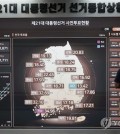- California Assembly OKs highest minimum wage in nation
- S. Korea unveils first graphic cigarette warnings
- US joins with South Korea, Japan in bid to deter North Korea
- LPGA golfer Chun In-gee finally back in action
- S. Korea won’t be top seed in final World Cup qualification round
- US men’s soccer misses 2nd straight Olympics
- US back on track in qualifying with 4-0 win over Guatemala
- High-intensity workout injuries spawn cottage industry
- CDC expands range of Zika mosquitoes into parts of Northeast
- Who knew? ‘The Walking Dead’ is helping families connect
Korean Air, Asiana struggle to retain pilots
By Lee Hyo-sik
Korean Air and Asiana Airlines are struggling to retain their pilots who are being tempted by higher salaries and better incentives offered by Chinese rivals, officials said Monday.
The increasing exodus of local pilots could pose a threat to aviation safety at the country’s two flagship carriers, with a growing number of airplanes being flown by inexperienced aviators.
Korean Air and Asiana Airlines say there isn’t much they can do about the growing exodus because they are not in a position to improve working conditions for pilots amid worsening bottom lines.
“China’s aviation market has been expanding at a swift pace over the past few years,” said an airline industry analyst, on condition of anonymity. “This means that Chinese carriers need more pilots capable of flying commercial jets, but there aren’t many experienced aviators in the world’s second-largest economy.”
The shortage of seasoned Chinese pilots has forced mainland carriers to recruit foreign pilots, and those flying with Korean Air and Asiana Airlines have become their main target.
“A pilot with 15 years of flight experience at Korean Air receives about 150 million won a year. But many Chinese carriers reportedly offer twice as much, on top of free housing and education subsidies for their children,” the analyst said. “Lured by fat paychecks and attractive benefits, an increasing number of Korean pilots have moved to China.”
Given that it normally takes many years to train a pilot, Chinese airlines will likely accelerate the recruiting of experienced Korean pilots in the coming years amid the mainland’s rapidly expanding aviation market.
In 2015, a total of 46 Korean Air pilots quit to work for Chinese carriers, up from two in 2014 and seven in 2013, according to airline industry data.
Sixty-one pilots quit Asiana Airlines last year to move to carriers based in China and other foreign countries, up from 31 in 2014 and 28 in 2013.
The flagship carriers have also seen an increasing number of junior pilots move to low-cost carriers.
“Pilots at budget carriers get paid less than those at flagship carriers, but they can become captains within four years while it takes about 10 years at Korean Air and Asiana Airlines,” the analyst said. “When they become captains, they can move to foreign carriers and receive more pay. So to advance their careers more quickly, some junior pilots prefer to work at budget airlines.”
Desperate to fill the void Korean Air, headed by president Chi Chang-hoon, has been taking all possible measures to retain pilots but to no avail. To fill the void, the carrier has hired more foreign pilots, in addition to retired Air Force pilots and those graduating from training schools at home and abroad.
The company recruited a total of 77 non-Korean aviators last year, up from 50 in 2014.
“We are not the only carrier hit by the pilot exodus. All major carriers around the world are grappling with the same problem,” a Korean Air spokesman said. “We are recruiting experienced and talented pilots through various channels to replace those who are leaving. We are doing everything we can to maintain an ample number of qualified aviators.”
Korean Air has been recruiting personnel who have completed the “Airline Pilot Program” at Korea Aerospace University in Goyang, Gyeonggi Province.
Asiana Airlines, headed by CEO Kim Soo-cheon, also said that to replace outgoing pilots, it has been hiring retired military pilots and aviators from other airlines.
“We will mobilize more resources to nurture pilots in cooperation with training institutions,” a company spokesman said.
The carrier is running its own pilot training program, while it has been hiring from among those who complete the training course at Hanseo University in Taean, South Chungcheong Province, since 2009.


















Pingback: China Luring Away Increasing Number of Korean Pilots - Branding in Asia Magazine
Pingback: January : "The Circuit"